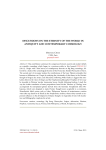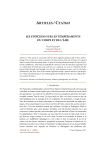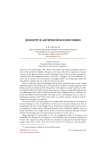Космос и душа. Рубрика в журнале - Schole. Философское антиковедение и классическая традиция

Discussions on the eternity of the world in antiquity and contemporary cosmology
Статья научная
This contribution continues the comparison between ancient and modern beliefs on scientific cosmology which began in a previous article in this Journal (ΣΧΟΛΗ 5.2 [2011]). I begin with a brief survey of contemporary theories on Big Bang cosmology, followed by a study of the cosmological theories of the Presocratic thinker Pherecydes of Syros. The second part of my paper studies the ramifications of the basic Platonic principle that bonum est diffusivum sui. I begin by studying the vicissitudes of this theory in the Patristic thought of Origen, the Arians, and Athanasius. Following Willy Theiler, I suggest that similarities between the views of Origen and the Neoplatonist philosopher Porphyry of Tyre may be traceable to Plotinus' teacher Ammonius Saccas. Finally, following Endress, I study the way the Arabic translation of some propositions from Proclus' Elements of Theology were accompanied by interpolated glosses derived from the Christian Neoplatonist John Philoponus, which were designed to make Proclus' thought more acceptable to a creationist, Monotheistic belief system such as Islam. Philoponus' theories of instantaneous creation were taken up, thanks to al-Kindi, by the Neoplatonica Arabica, whence they exerted an important influence on the development of Islamic thought. An Appendix of texts with translation and bibliography completes the article.
Бесплатно

Les sto"iciens sur les temp'eraments du corps et de l’^ame
Статья научная
This article is concerned with the often neglected physical side of Stoic anthropology. The care for one’s soul is central to the Stoic notion of the art of living. Yet a special status is reserved for the human body—in spite of its being subsumed under the class of (preferred) ‘indifferents’. This status is explicable by reference to the fact that they regard the soul as a subtle kind of breath ( pneuma ) and hence as corporeal. As such, it is blended with the human body through and through. Care for the soul therefore involves care for the body. Furthermore, the Stoic view of the human organism entails a special interest in physiognomy. These interrelated aspects are studied against the backdrop of the relevant medical theories used by the Stoics.
Бесплатно

Статья научная
Статья начинается с краткого разбора основных элементов ранних греческих космологий Ферекида Сиросского и орфиков. Основное внимание уделяется фигуре Кроноса и демиургической активности Зевса. Античная космогония сопоставляется с современной теорией времени И. Пригожина, который, подобно древним космологам и в отличие от сторонников стандартной космологической модели (теории Большого взрыва), считает, что время не возникло вместе с нашим миром и не закончится после его исчезновения. Затем я перехожу к подробному изучению платонической метафоры кормчего (kybernētēs) в контексте античной интеллектуальной традиции. Наконец, в качестве иллюстрации к теме я изучаю необычную кельтскую монету, выпущенную в Нормандии ок. 100 до н. э., на которой изображен воин на колеснице, держащий в руке приз победителя в виде модели корабля. Интересно наблюдать, как, истолковывая мифологический образ в политическом смысле, неизвестный кельтский мастер проделывает тот же путь, что и древнегреческий философ.
Бесплатно

